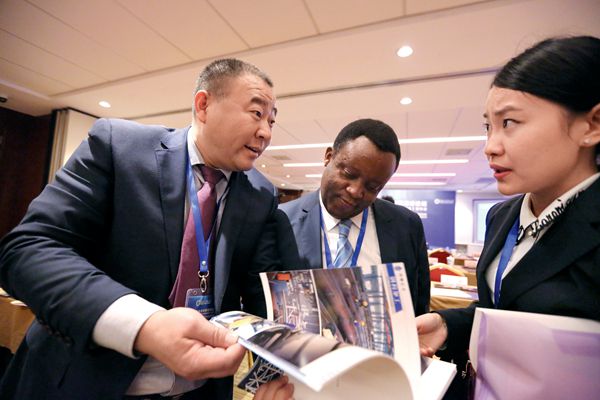A New Phase of Globalization
China Today by He Yafei, December 20, 2016 Adjust font size:

Henan Yili Steel Construction Engineering is one of the many Chinese enterprises that have launched cooperative projects in Africa stemming from the Belt and Road Initiative.
In the 21st century, the U.S.-advocated unilateralism impacted heavily on the system of global governance. The U.S. quickly realized that it was not easy to be the “world’s police.” After President Barack Obama took office, the U.S. put greater emphasis on its domestic political agenda. Meanwhile, it shifted the focus of its external strategy away from Europe and the Middle East, to Asia. This new focus on Asia and the Pacific has diverted attention from anti-terrorism to the rising of emerging powers.
Meanwhile, emerging economies like China have been highlighting a new system of global governance. The world invites China to share its experience in development and accepts governance based on cooperation between East and West. Standing at the center of the world stage and a new starting point of history, China is expected to make a contribution, helping global governance to be more just, equitable, and reasonable.
A major player in global governance, China successfully hosted the G20 Summit last September. In one sense, China’s development overlaps the reform of the global governance system, which indicates the important role that Chinese wisdom and philosophy play in global governance. President Xi has, on several occasions, put forward the idea of providing global ideas fueled by Chinese wisdom and perceptions.
In which areas of global governance is the country expected to play a leading role?
First, China unswervingly upholds the UN-centered international order and system of global governance. A consensus reached by the international community after WWII, this governance structure has been proved to be generally in line with the common interests of the world. China is not only a beneficiary in this system, but also a supporter, builder, and contributor. It is ill-founded to criticize the country by suggesting that it wishes to damage or destroy the existing structure. As a matter of fact, China has no intention of setting up a new system.
Within the current framework, China continues to facilitate the improvement of international institutions and rules by beefing up such mechanisms as the G20, BRICS, the Shanghai Cooperation Organization, the Asian Infrastructure Investment Bank, the New Development Bank, among many others. It also advocates democracy in international relations, pushing for win-win cooperation and mutual development so as to perfect the global governance system and strive to give developing countries more of a voice.
The world also expects China to come up with innovative ideas and projects to refine the guiding principles of global governance based on the country’s ancient civilization and its fusion of different cultures. To this end, worldwide cultural communication and integration shall be encouraged while “clashes of civilizations” must be abandoned. The Belt and Road Initiative, proposed by President Xi in 2013, has demonstrated the country’s willingness to share its development achievements with all the countries along the route and to help them along the way of progress. Covering various fields, including exchanges on policies, strategy coordination, and people-to-people interactions, the initiative is one of the efforts China has exerted to enhance global governance based on its philosophy of common development. In 2015, when addressing the annual conference of the Bo’ao Forum for Asia, Xi proposed a conference of dialogue among Asian civilizations to be held with the aim of boosting regional cooperation and development.
China advocates peaceful development and hopes to see all countries look beyond, instead of fixing their focus on narrow geopolitics. Relations between major powers must be maintained in the right way. The Thucydides’ trap must be avoided so as to foster a long-term peaceful environment for international politics and security.
With a foundation of peace, development guarantees peace. On the one hand, our world is not able to make any progress without peaceful conditions. On the other, long-term peace cannot be ensured without development. China deeply understands this process, due to its suffering in the 19th and the early 20th centuries.
Moreover, China has put into practice new principles featuring zero conflict, zero confrontation, mutual respect, and win-win cooperation, in building a new mode of major-country relationships with the U.S., which is expected to be adopted in its relations with more countries.
Now that the world has ushered in a new era, globalization has entered a new phase as well. We will certainly see a harmonious world and an ever-growing economy as long as all countries pursue the path of peaceful development.
He Yafei is deputy head of the Overseas Chinese Affairs Office of the State Council and a former Deputy Minister of Foreign Affairs.